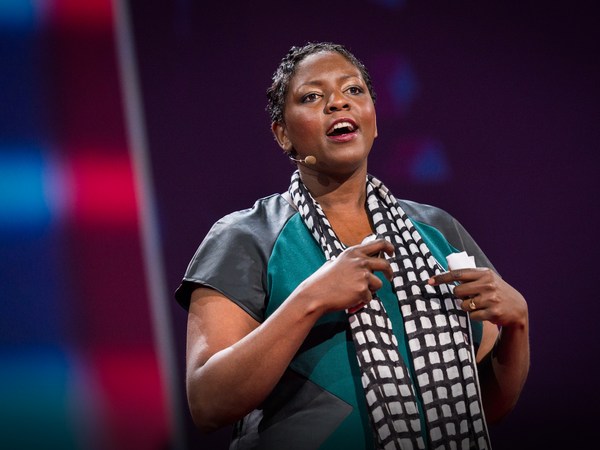When people announce that they're going to have children, the normal reaction that you get is, "Congratulations!" When you announce that you're going to adopt, you can get a slightly different reaction. And when you're a gay couple and announce that you're going to adopt children, you can get a very different reaction. My partner Emma and I got to a stage in our relationship where we wanted to start a family, like lots of people do. Because we're two women, we had to look into the options, and the options that we wanted to focus on were about adoption or fostering, but at the time, we didn't really know much about either. And so, what I want to talk to you about is the journey that we took to becoming the first openly gay couple to be approved for adoption here, in Bristol, with Bristol City Council. That was 11 years ago, and then, it subsequently led to us having our son Steven. So, you'll hear me talking about him as well. Thank you. (Applause) Thank you. Now, opinions on gay adoption run very, very deep, and it's a complicated mix, I find, of a number of things, kind of the idea of upholding "family values." There are assumptions about gender roles, there are misunderstandings about actually the process of adoption, and there's a kind of slight level of panic about the idea of putting children into "gay lifestyles." So, what I want to do is try and pick a few of those things and then explain some of the things that are different and some of the things that are exactly the same about having a family with two moms. So, we made that first call to Bristol City Council, that was 12 years ago, and they sent around a social worker and we said, you know, "Adoption, fostering, what's all that about?" And they said, "Well, let me put one question to you, firstly. Would you like a job, or would you like a family?" And we said, "No, we definitely want a family." So, they said, "Fine, the permanent nature of adoption is for you." So we said, "Great, that's the first sort of simple thing there's to decide. So, what do we do next?" They said, "We'll book you on a workshop. Go and find out more about it. Come back to us, we'll put you through the application process, and you'll move on to become approved." So, it was great! That was it. It seemed all so simple. And so, we kind of skipped off and we started to tell friends and family that we wanted to adopt, and this was where we didn't necessarily get the "Congratulations!" that we might have expected. We got a lot of concerned looks, and we got a lot of questions. We got people who said to us, "Are you even allowed to do that?" We got people who just said to us, "Why? Why would you want to do that? That is going to be so hard." And one of my colleagues at the time took me to one side and said, "Lynne, you need to not tell people that you're doing this. There are an awful lot of people out there who will disapprove of this very, very strongly, and you need to be careful." And he was right. Media headlines still to this day, just [like] last month, will talk about the views such as people believing that gay adoption is just morally wrong; that gay people who want children do it because they want some sort of "trophy" in order to mimic heterosexual lifestyles; that gay people will turn their children gay. Good luck with that. (Laughter) And some people even believe that placing children with gay parents is a form of abuse. And one of the things that I want to do today, kind of just for the record, is to say to you I am not on some sort of mission to undermine family values. Steven is my son. He is not some sort of lifestyle accessory for me. And not only do we not abuse him, we support him in dealing with the very difficult early years that he had which led to him being in the care system in the first place. But, back to the story. We skipped off to our workshop. We were so excited. We were apprehensive, but we were like so enthusiastic, we wanted to go on. We were like, "Woohoo!" And of course, we walked into a room with people who had already been through the very long, the very difficult, and the very exhausting journey of having fertility treatment, but without success. Those people were at the end of the road, and for those people, adoption can be a last choice. Now, I'm not suggesting that that affects their ability to be fantastic parents, but for Emma and I, we came to adoption very differently. For us, it was our first choice, and it was an exciting new beginning. And the research into gay adopters is now showing that this is one of the common themes: gay adopters often choose adoption as their first choice, unlike many heterosexual couples, and because of that, it means we come with a different set of more positive expectations at the beginning. Now, the other thing that that workshop gave us was an incredibly eye-opening view into the kids in our care system, who were then up for adoption. And this is where we have a number of assumptions that get made, and misunderstandings about the adoption process itself. Now, adoption has changed a lot over the years, but there are still sort of characters and, I'd say, myths around, like the kind of "Orphan Annie," like that sort of little children, just waiting for people to come along and kind of scoop them up. There is still the very real fear that social workers somehow have the ability to waltz into families and just take children away, without any hint of concern. Now, all cases are different, but the majority of children who are up for adoption are there because of abuse or neglect, or both. And because of that neglect or abuse, they can have learning difficulties, they can have attachment disorders and they can have developmental delays. And those things are then made worse if they are bounced around the care system. These kids are special. These kids are different. And this is where the research into gay adopters is coming up with a common theme. For very different reasons, gay people know what it's like to be different, and because of that, the research is showing that we come to adoption with a greater level of empathy, and we come with a greater level of flexibility in our parenting. So, we got through the workshop. We were then off into the application process. So, we were matched up with a social worker, she was absolutely fantastic, and she quite rightly grilled us on every single question in that form. We were given homework to do, our parents were interviewed, our friends were interviewed, and it was all around our ability to be assessed to provide what's called "therapeutic parenting." Now, there was one question in that form that we didn't spend hours soul-searching about, and that question was: "If you have a child who then turns out to be gay, how would you feel?" (Laughter) And we were able to say, "I think we'll be fine." (Laughter) And the social worker said, "Yes, I think you'll be fine, too. Let's move on." (Laughter) So, our application went in, and we headed off to the approval panel. Again, we were asked a great number of questions, but one of those questions was: "Boys, especially, need dads. If you have a boy, how are you going to provide the support that dads do?" And again, this is a very good question, and this is an important question, but this is one that involves assumptions about gender roles. So, my answer was kind of in two parts. Firstly, I said to them, "Well, it depends on what you mean when you say 'what dads do.' If you mean who will take a child down a park on a Saturday afternoon and kick a ball around; who will fix a puncture on a bicycle; who will tinker with a computer, my answer to that is, we will. We will do those things. Emma and I do those things. Women can do dad things." Thank you. (Applause) And that is in exactly the same way that men can do mom things. (Applause) Over the years, Emma and I have been quad-biking, we've been parascending, we've been to tank museums. This time last year, I was with Steven and thousands of other teenage boys and an awful lot of grown men, far too many of which were dressed as "Thor," at the Gamer Expo in London. And so, this is a "dad thing" that I get to do, and I had a fantastic day. But what we can't do, and what we don't pretend to be able to do, is to provide a male perspective on things: on shaving, on having your voice break, on what it's like to actually communicate with other men when women aren't around. But in those situations, we call upon the fantastic circle of men that we have in our friends and family. Steven has lovely granddads, he has amazing uncles, cousins. We rope in the husbands of our friends and we rope in our own male friends, and they advise us on what we might do and they also spend time with Steven. So, we got through the approval panel, that was a great day. It was only at that point that we were then told that we were the first gay couple to have gone through that. So that was fantastic. So, off we skipped into the next stage, very excitedly, which is the matching process. And so, you call local authorities up and down the country to inquire about the children that are in their care systems, and this is where we hit a huge wall of negativity. We had lots of awkward silences. We had lots of people who said, "I'm sorry. We believe that child needs a dad," but with no discussion at all about what that actually meant. We had lots of people who actually just said to us, "We believe what you're doing is wrong." And that was the worst part for us in the process. It was incredibly battering, and we really weren't sure that we were ever going to get matched, or get through. We thought we might just have to give up. And then, we got a phone call after we had inquired about a five-year-old boy, and after many more meetings and another panel, a matching panel, we were matched with Steven. He was nearly six. He's now 16. And that part of the process for us was made a lot easier because of Steven's foster family being so supportive. They prepared Steven by saying to him that he was such a special little boy he was not just going to get one mom, he was going to get two. And that was amazing. It was amazing for us, but it was incredibly positive for Steven, at that very difficult time when you're transitioning. And I was talking to Steven's foster family this summer, and of course they said, "Yes, but it's created a little bit of a throwback potentially, because now we have other foster children who kind of stand there going, 'Well, I am super special too, and I think I want two moms.'" (Laughter) But Steven doesn't just have two moms. Steven has a birth family, and we have contact with them. Steven has a foster family, and they have become great friends. And Steven has an adoptive family, and that isn't just Emma and myself; it is all of my wider family and it is all of Emma's wider family. So, 12 years on from that first workshop, how are we all doing? Well, Steven spends an awful lot of time in his bedroom, on his own. He spends a lot of time on Facebook. It's been like his phone has kind of melded to his hand. He spends an awful lot of time in front of the bathroom mirror. He thinks we're totally embarrassing. He doesn't really want to be seen out with us in public. He believes our mission in life is to nag him and to stop him from doing everything he really wants to. So, we kind of feel that really we've raised a pretty normal teenage boy. (Laughter) But more seriously, Steven is doing brilliantly. Despite his very difficult start in life, he has always been very intelligent, he has always been very funny. He loves computers. He's a great photographer. He's very creative. We are incredibly proud of everything he achieves, and he is an amazing young man. But he struggles to deal with the consequences of those very difficult early years, and he always will. They are a very significant part of who he is, they shape his sense of self and they shape his sense of his future, particularly so during adolescence. Now, what about Emma and I? How are we doing? Well, just because we might have a bit more empathy and we might have a bit more flexibility, that does not make us perfect parents. In exactly the same way as other parents do, we struggle. There are some days where we get it broadly right, there are some days where we mess it up completely, but we love Steven and we tell him that every single day, again, much to his annoyance and embarrassment, really. (Laughter) So, is there a moral to this tale? Well, yes, there is. We should not assume that families are a certain number or a certain gender of people. Families come in all shapes and sizes. They always have, and they always will. And gay adopters, gay parents, we are just actually one very small part of that mix. And that's OK. It really is. We are not as different and we are certainly not as threatening as the media headlines might have people believe. Thank you. (Applause)
Related talks
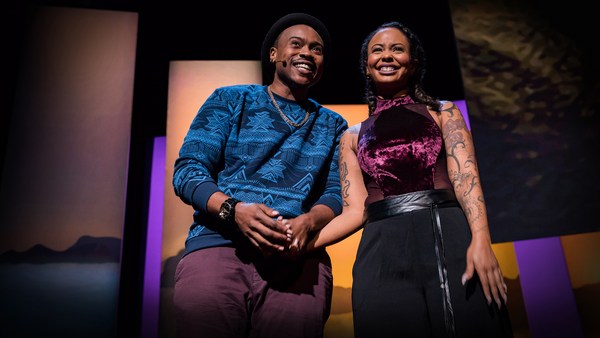
Tiq Milan and Kim Katrin Milan: A queer vision of love and marriage
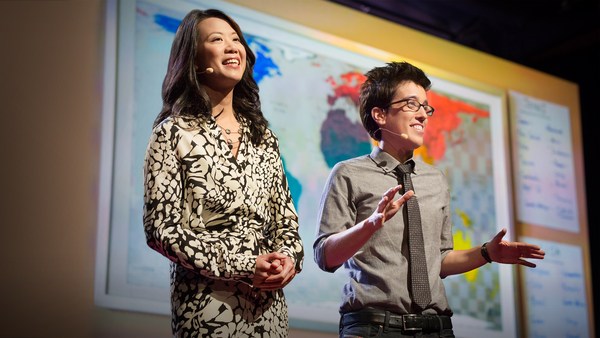
Jenni Chang and Lisa Dazols: This is what LGBT life is like around the world
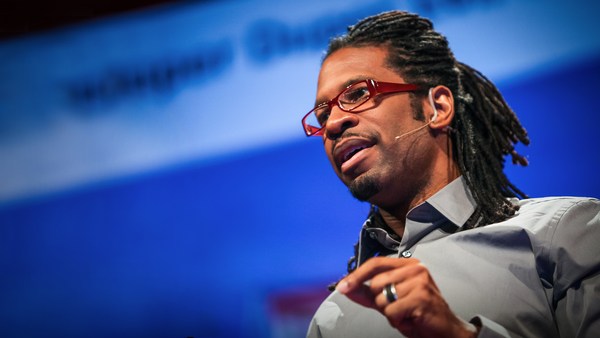
LZ Granderson: The myth of the gay agenda
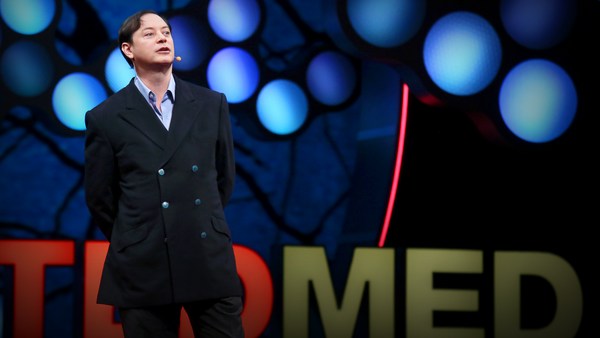
Andrew Solomon: Love, no matter what
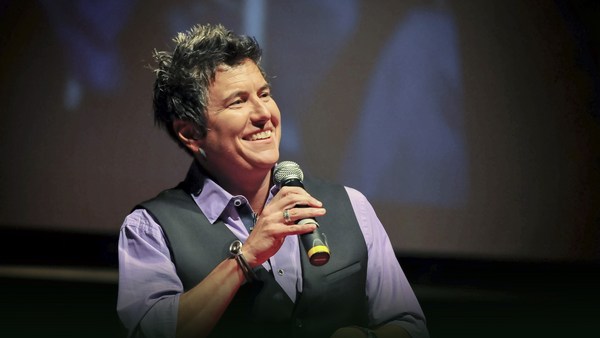
Ash Beckham: We're all hiding something. Let's find the courage to open up
